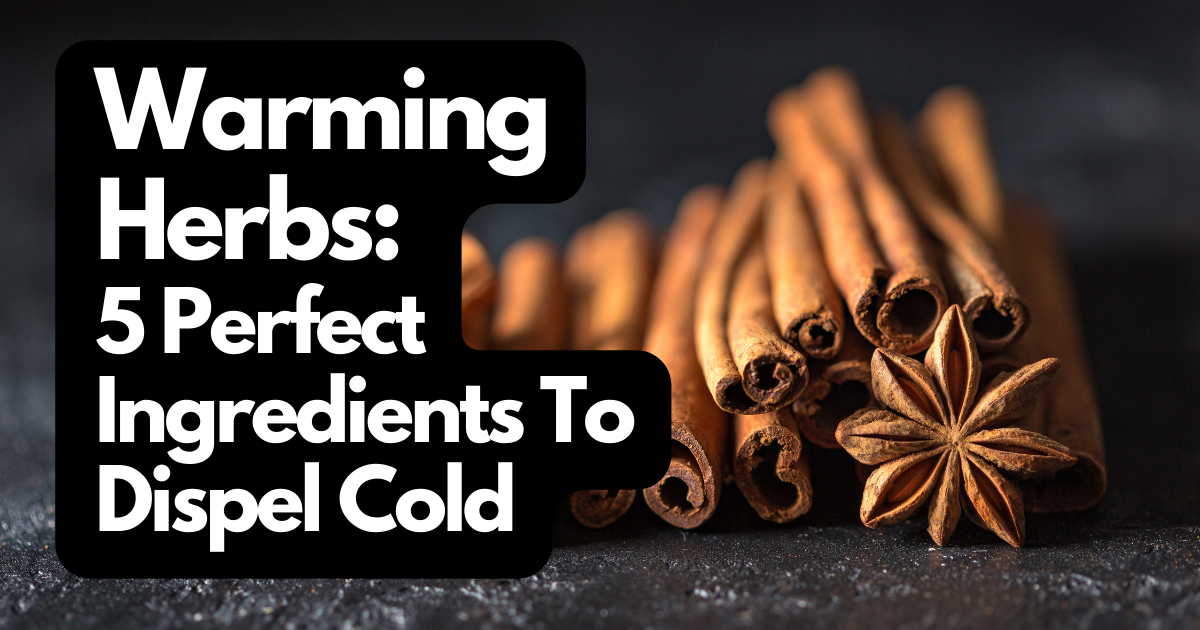
Traditional Chinese Medicine suggests that seasonal infections are less viruses and more a signal of a state of imbalance. Essentially, your body's constitution has been affected by an 'external cause', and in order to get rid of it, certain herbal remedies can be applied.
Cold is one of ‘The Six Evils’, a set of exogenous pathogenic factors that fluctuate depending on the climate. This can cause a variety of interior issues that tend to manifest in symptoms we traditionally attribute to winter viruses.
Helpfully, there's an assortment of 'warming herbs' that can help dispel cold – and the best part is, many of them are ingredients that can be used in a variety of exciting culinary ways. But first.
What is a Warming Herb?
Warming herbs are a collection of herbs and spices that possess innate heating properties. They've been used in TCM for millennia to treat a variety of different medical issues. Generally, they have a strong, distinct, often spicy quality.
Popular Examples of Warming Herbs
Ginger
Turmeric
Garlic
Cayenne
Cinnamon
Why Would I Need Warming Herbs?
Warming herbs are used to combat issues that could benefit from warming action. This isn't a hard and fast rule, but generally, symptoms you'd usually associate with winter infections (chills, shivering, fever, poor circulation) are caused by an excess of cold.
Excess cold can also be caused by zang-fu organ issues. A lack of qi in certain organs can disrupt the natural balance of the body, and also exacerbate conditions that have arisen from external causes.
The idea is that certain herbs with warming properties can treat and eventually correct this excess. In simplistic terms, dispelling cold largely becomes a matter of applying heat. However, it is useful to understand how and why that cold manifests in the first place...

What are The Six Evils?
Disease can have external and internal points of origin. Mental health issues tend to come from internal causes. Conversely, many ailments of a physical nature are traditionally created by external causes. The Six Evils are external causes—constitution-affecting pathogens that, as mentioned, are linked directly to the climate of your surroundings.
The Six Evils
Wind (feng)
Heat (re)
Fire (huo)
Dryness (zao)
Cold (han)
Dampness (shi)
If you live in a chilly environment, or an environment that has recently suffered a drop in temperature due to a change in climate, your body is at risk of being invaded by the cold pathogen. While that might sound pretty fearsome, there's a huge amount of warming herbs that can help keep it at bay. Herbs that can even be used in the kitchen, for example...
5 Warming Herbs to Dispel Cold
Dried Cinnamon Bark 肉桂 (Rou Gui)
Warming herbs don’t always taste delicious, and so when you find one that does, cherish it! Dried cinnamon bark is one of those herbs, possessing potent warming properties along with a delightfully idiosyncratic taste profile.
If you are interested in dried cinnamon bark for those warming aspects, you’ll be delighted to know it may clear interior cold. It also has the potential to warm and tonify the kidneys, a vital organ in the dispersal and regulation of water within the body.
Taste
Sweet, woody, spicy
Culinary Uses
Cinnamon tea
Ground cinnamon
Vegetable soup
Porridge
Dried Cinnamon Bark 肉桂 (Rou Gui) | (50g) - Buy Now
Dried Liquorice Root 甘草 (Gan Cao)
Dried liquorice root is a unique, tangy herb with the type of versatility that ensures you’ll never tire of experimenting with it. Treasured in both culinary and medicinal circles for millennia, Gan Cao balances innate warming capabilities with an unforgettable taste profile.
The spleen is responsible for the effective distribution of food essence to other organs; poor spleen qi could mean a reduction in strength and a weakened immune system, which may lead to increased susceptibility to colds. Gan Cao can potentially bolster Spleen qi.
Are you used to feeling demotivated and lethargic during spells of illness? It’s said that the spleen also holds yi, or willpower. By utilising ingredients that dispel cold and treat specific qi imbalances, you could set yourself up to tackle the festive season with confidence*.
Taste
Pungent, bittersweet, anise
Culinary Uses
Liquorice root tea
Carrot, onion, and liquorice root soup
Dried Liquorice Root 甘草 (Sliced) (Gan Cao) | (500g) – Buy Now
Dried Siberian Ginseng 刺五加 (Ci Wu Jia)
An immovable fixture of Chinese medicine for thousands of years, ginseng is also one of the most well-researched herbs of the modern era. The potential health benefits of this plant are vast: one study notes immunomodulatory activity, possible anticarcinogenic functions, and positive impact on learning and memory.
Going into the other possible medicinal uses would require its own blog post (let us know if you’d be interested in that!), so we’ll get back to the topic. Ginseng has long been known for its warming properties, and dried Siberian ginseng could be a fantastic way to utilise those properties while also adding an innovative kick to your meals.
Taste
Grassy, bitter, tangy
Culinary Uses
Ginseng and honey herbal tea
Powdered spice
Ginseng soup
Dried Siberian Ginseng 刺五加 (Ci Wu Jia) | (500g) – Buy Now
Dried Orange Peel 陈皮 (Chen Pi)
Dried orange peel, or ‘chen pi,’ is a cast-iron favourite in Eastern cuisine for its unmistakably sharp taste. So citrussy as to border on spicy, it holds significant warming value, making it a prime option for anyone seeking to address cold excess or preemptively tackle it before it can take hold.
Chen Pi can be used in a variety of dishes. It can even be eaten as is—the small, citrussy bites make it a perfect energy boost during the day. We like to brew the peelings in a tea and consume it that way.
Taste
Sweet, tangy, sharp, citrussy
Culinary Uses
Herbal tea
Dessert topping
Snack
Cupcakes
Cocktails
Dried Orange Peel 陈皮 (Chen Pi) | (100g) – Buy Now
Dried Eucommia Bark 杜仲 (Du Zhong)
Eucommia ulmoides is a beautiful shade tree native to central China. One study explores its extensive range of potential health benefits, ranging from, but not limited to, antioxidant, antibacterial, antiviral, and anti-inflammatory.
Du Zhong is said to be rich in amino acids, polysaccharides, and vitamins. It also has significant warming capabilities and is associated specifically with the Liver and kidney. Consumption of this herb may result in a boost of yang functions overall.
Taste
Sweet, warm, pungent
Culinary Uses
Eucommia bark hot chocolate
Eucommia bark soup
Eucommia bark herbal tea
Dried Eucommia Bark 杜仲 (Du Zhong) | (500g) – Buy Now
Summary
There are a variety of distinct warming herbs that can be used to fight off symptoms that arise from an infection of the cold pathogen. Luckily, the herbs you'll find on Vita Herbal Nutrition can be incorporated into a variety of exciting, palate-expanding dishes that nourish the heart as well as attempting to banish cold.
Do you have any special recipes for any of the above ingredients? We'd love to hear about them in the comments below. We've also got a rundown of three other warming herbs that can help dispel cold.
*Vita Herbal Nutrition cannot guarantee the positive effects of its products. Results may vary. Our products are not designed to treat medical conditions or diseases and have not been evaluated by food and drug administrations.
